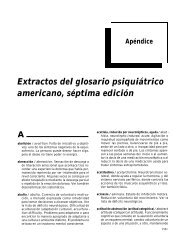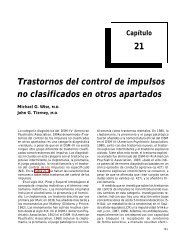M - PDFuploader
M - PDFuploader
M - PDFuploader
Create successful ePaper yourself
Turn your PDF publications into a flip-book with our unique Google optimized e-Paper software.
Tema 7 El régimen de los verbos<br />
stehen Etwas steht ihr gut. = Algo le sienta bien (a ella).<br />
weh tun Etwas tut ihr weh. = Algo le duele (a ella).<br />
* Nota sobre el verbo gustar<br />
Sus múltiples usos en castellano se expresen en alemán con<br />
los siguientes verbos o construcciones verbales:<br />
a) Gefallen (nominativo, dativo) = construcción nominal<br />
= gustar desde un punto de vista estético:<br />
Das Kleid gefällt mir gut.<br />
b) Schmecken (nominativo, dativo) = construcción<br />
nominal<br />
= gustarle a uno lo que come o bebe:<br />
Dieser Wein schmeckt ausgezeichnet.<br />
c) Mögen (nominativo, acusativo) = construcción nominal<br />
= gustar en general:<br />
Er mag Katzen.<br />
d) Gern (lieber, am liebsten) + verbo = construcción verbal<br />
= gustarle a alguien hacer algo:<br />
Sie spielt gern Tennis.<br />
Er iBt lieber Fleisch als Gemüse.<br />
Der Junge spielt am liebsten Fußball.<br />
e) Lieben (nominativo, acusativo) = construcción nominal<br />
= gustar, amar, querer (personas, animales, países, ciudades,<br />
pueblos, paisajes y cosas de importancia fundamental para<br />
el hombre: la patria, la libertad, el dinero, la vida, la justicia<br />
etc.):<br />
Ich liebe dich.<br />
Er liebt Hunde.<br />
Meine Heimat liebe ich.<br />
Viele Leute lieben das Geld.<br />
7.3. Verbos que en alemán rigen dativo y en español acusativo<br />
o complemento prepositivo.<br />
Ejemplos:<br />
sich j-m anschließen Ich schließe mich ihr an. Me adhiero a ella. (su<br />
opinión)






